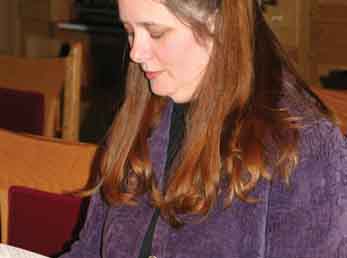May Christ bring us all together to everlasting life. Rule of Benedict
Lectio Divina, the monastic practice of Sacred Reading, dates back to ancient times when illiterate monks listened to their literate sisters and brothers read scripture.
Their purpose was not to study Bible passages, but to be moved by them; to, in the words of Thomas Keating, "think the text (but not) about the text," or to, in the words of St. Benedict, "listen with the ear of the heart."
Lectio is the practice of listening to a scriptural passage without preconceived thought or intellectual study. It is not Bible study; nor is it an opportunity to share or discuss.
It is an opportunity to quiet oneself and be receptive to God speaking through the Holy Spirit.
"Lectio is a prayerful process of reading the scriptures in the light of the Holy Spirit," Sr. Catherine Cleary, OSB, explains. She says Lectio has undergone changes in popularity over the centuries, but that it is growing in popularity now.
"Everyone can do it, although some are more drawn to it."
For those who are more comfortable with structured prayer, Lectio may not hold much allure. But, practitioners would urge others to try it, because the benefits are so strong.
"As you practice Lectio, it will begin to change you," Sr. Catherine notes.
"You'll begin to absorb what you're reading, whether you're alone or in a group. You'll begin to put on the heart and mind of Jesus. You'll begin to act like what you're reading."
Ask those who practice Lectio how it has affected them, and you will hear impassioned responses. Kay Mallon, Peoria, Ill., says she became curious about Lectio when she worked as a counselor at Lutheran Social Services in Peoria.
"Sr. Catherine was one of my colleagues," she remembers.
"I knew how stressful her job was, but she always had a calm about her. I asked her how she did it. She told me about Centering Prayer and Lectio, and I started attending a group that practiced it. It has helped me be calm and balanced. I feel like I have my priorities right."
Those priorities include being open to other people.
"I compare Lectio to physical exercise," she explains. "I go to the gym for the strength to pick up my grandkids, and the agility to get down on the floor and play with them.
"I do Lectio for the strength to be in relationship with others. I am able to listen better, to be open to other people's views and ways. I don't need to state my way of thinking as much. I'm less critical. Day to day, Lectio might be the furthest thing from my mind, but the effects of it are with me."
The effects remain for spiritual director Sr. Margaret Murphy, OSB, too.
"I feel more reflective and observant all day," she says. "Lectio helps me to develop an openness and receptivity to the Word of God in Scripture, as well as in nature and in events. It helps me see God everywhere, and hear what God might be saying."
Here's how to practice Lectio:
Quiet yourself. You can begin with a simple word prayer, or breathing exercises. Open your Bible and read 2 or 3 lines slowly. In silence, let the words simply rest in you.
Read the text again. This time, interact with it. Ponder it. Speak with God about it. Is there a word or phrase that speaks to you? What is it saying to you?
Read the text again. This time, simply rest in the words. Thank God for being with you both in words and in silence.
As you go through your day, continue to ponder the reading and what you experienced in it. It will, as Father Michael Casey, OSB writes, provide "a place to which we can return momentarily to center ourselves and, perhaps, find peace in the midst of busyness."
